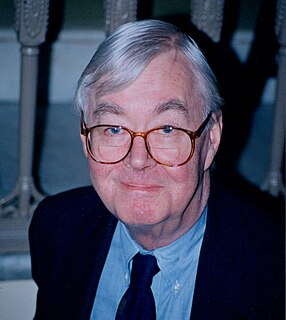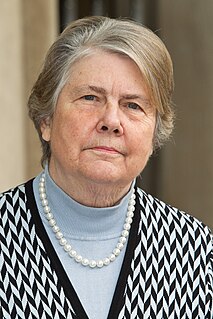Related Research Articles

The Cato Institute is an American libertarian think tank headquartered in Washington, D.C. It was founded in 1977 by Ed Crane, Murray Rothbard, and Charles Koch, chairman of the board and chief executive officer of Koch Industries. Cato was established to have a focus on public advocacy, media exposure and societal influence. According to the 2020 Global Go To Think Tank Index Report, Cato is number 27 in the "Top Think Tanks Worldwide" and number 13 in the "Top Think Tanks in the United States".

Daniel Patrick Moynihan was an American politician, diplomat, and sociologist. A member of the Democratic Party, he represented New York in the United States Senate from 1977 until 2001 and served as an adviser to Republican President Richard Nixon.

The Brookings Institution, often stylized as simply Brookings, is an American research group founded in 1916. Located on Think Tank Row in Washington, D.C., the organization conducts research and education in the social sciences, primarily in economics, metropolitan policy, governance, foreign policy, global economy, and economic development. Its stated mission is to "provide innovative and practical recommendations that advance three broad goals: strengthen American democracy; foster the economic and social welfare, security and opportunity of all Americans; and secure a more open, safe, prosperous, and cooperative international system."
William Julius Wilson is an American sociologist. He is a professor at Harvard University and author of works on urban sociology, race and class issues. Laureate of the National Medal of Science, he served as the 80th President of the American Sociological Association, was a member of numerous national boards and commissions. He identified the importance of neighborhood effects and demonstrated how limited employment opportunities and weakened institutional resources exacerbated poverty within American inner-city neighborhoods.
Warren Demian Manshel was an investment banker; an editor and publisher; and a diplomat.
Michael W. Doyle is an American international relations scholar who is a theorist of the liberal "democratic peace" and author of Liberalism and World Politics. He has also written on the comparative history of empires and the evaluation of UN peace-keeping. He is a University professor of International Affairs, Law and Political Science at Columbia University - School of International and Public Affairs. He is the former director of Columbia Global Policy Initiative. He co-directs the Center on Global Governance at Columbia Law School.
The Negro Family: The Case For National Action, commonly known as the Moynihan Report, was a 1965 report on black poverty in the United States written by Daniel Patrick Moynihan, an American scholar serving as Assistant Secretary of Labor under President Lyndon B. Johnson and later to become a US Senator. Moynihan argued that the rise in black single-mother families was caused not by a lack of jobs, but by a destructive vein in ghetto culture, which could be traced to slavery times and continued discrimination in the American South under Jim Crow. Black sociologist E. Franklin Frazier had introduced that idea in the 1930s, but Moynihan was considered one of the first academics to defy conventional social-science wisdom about the structure of poverty. As he wrote later, "The work began in the most orthodox setting, the US Department of Labor, to establish at some level of statistical conciseness what 'everyone knew': that economic conditions determine social conditions. Whereupon, it turned out that what everyone knew was evidently not so." The report concluded that the high rate of families headed by single mothers would greatly hinder progress of blacks toward economic and political equality. The Moynihan Report was criticized by liberals at the time of publication, and its conclusions remain controversial.

Theda Skocpol is an American sociologist and political scientist, who is currently the Victor S. Thomas Professor of Government and Sociology at Harvard University. She is a highly influential figure in both sociology and political science. She is best known as an advocate of the historical-institutional and comparative approaches, as well as her "state autonomy theory". She has written widely for both popular and academic audiences. She has been President of the American Political Science Association and the Social Science History Association.

William Dawbney Nordhaus is an American economist, a Sterling Professor of Economics at Yale University, best known for his work in economic modeling and climate change, and one of the 2 recipients of the 2018 Nobel Memorial Prize in Economic Sciences. Nordhaus received the prize "for integrating climate change into long-run macroeconomic analysis".

Isabel Van Devanter Sawhill is a senior fellow at The Brookings Institution, where she formerly held the position of vice president and director of Economic Studies, among other duties. She has authored or co-authored many books, including Generation Unbound: Drifting Into Sex and Parenthood Without Marriage, and Creating an Opportunity Society with Ron Haskins. She won a Daniel Patrick Moynihan prize with Ron Haskins.

Economic mobility is the ability of an individual, family or some other group to improve their economic status—usually measured in income. Economic mobility is often measured by movement between income quintiles. Economic mobility may be considered a type of social mobility, which is often measured in change in income.
The American Academy of Political and Social Science (AAPSS) was founded in 1889 to promote progress in the social sciences. Sparked by Professor Edmund J. James and drawing from members of the faculty of the University of Pennsylvania, Swarthmore College, and Bryn Mawr College, the Academy sought to establish communication between scientific thought and practical effort. The goal of its founders was to foster, across disciplines, important questions in the realm of social sciences, and to promote the work of those whose research aimed to address important social problems. Today the AAPSS is headquartered at the Annenberg Public Policy Center at the University of Pennsylvania in Philadelphia and aims to offer interdisciplinary perspectives on important social issues.
Kent Weaver is a professor at Georgetown University and a senior fellow in Governance Studies at the Brookings Institution. His focus is on a variety of fields in U.S. political science, including comparative social policy, comparative political institutions, and the politics of expertise. Weaver joined the Georgetown Public Policy Institute in the fall of 2002, after 19 years at the Brookings Institution. Before coming to Brookings, Weaver taught in the Political Science Department at the Ohio State University for several years. He received his B.A. from Haverford College and his Ph.D. in Political Science from Harvard University.
Harry Joseph Holzer is an American economist, educator and public policy analyst.
Welfare culture refers to the behavioral consequences of providing poverty relief to low-income individuals. Welfare is considered a type of social protection, which may come in the form of remittances, such as 'welfare checks', or subsidized services, such as free/reduced healthcare, affordable housing, and more. Pierson (2006) has acknowledged that, like poverty, welfare creates behavioral ramifications, and that studies differ regarding whether welfare empowers individuals or breeds dependence on government aid. Pierson also acknowledges that the evidence of the behavioral effects of welfare varies across countries, because different countries implement different systems of welfare.

Carol Graham is the Leo Pasvolsky Senior Fellow at the Brookings Institution, a College Park professor at the School of Public Policy at the University of Maryland, a research fellow at the Institute for the Study of Labor (IZA), and the author of numerous books, papers and edited volume chapters.
Margaret M. Weir is an American political scientist and sociologist, best known for her work on social policy and the politics of poverty in the United States, particularly at the levels of state and local government.
Mary Jo Bane is an American political scientist who focuses on children and welfare. She is currently the Thornton Bradshaw Professor at Harvard Kennedy School, and formerly the Malcolm Wiener Professor of Social Policy and Director of the Malcolm Wiener Center for Social Policy.
Mark Considine is an Australian political scientist, who specialises in public sector reform, and reforms of social services. Since 2018, he has been Provost of the University of Melbourne. He is a Fellow of the Academy of the Social Sciences in Australia and the Institute of Public Administration Australia.
References
- ↑ "Fellows". aapss.org. Retrieved May 8, 2017.
- ↑ "Prize". aapss.org. Retrieved May 8, 2017.
- ↑ "Ron Haskins". brookings.edu. Retrieved May 8, 2017.
- ↑ "Fellow Joins White House Welfare Reform Effort". brookings.edu. Retrieved May 8, 2017.
- ↑ King, James. "Brookings scholars Ron Haskins and Isabel Sawhill make history as the first joint recipients of the Daniel Patrick Moynihan Prize". Brookings. Retrieved 2018-09-29.
- ↑ "Ron Haskins, 2016-17 — Institute for Social Sciences". socialscience.ucdavis.edu. Retrieved 2018-09-29.